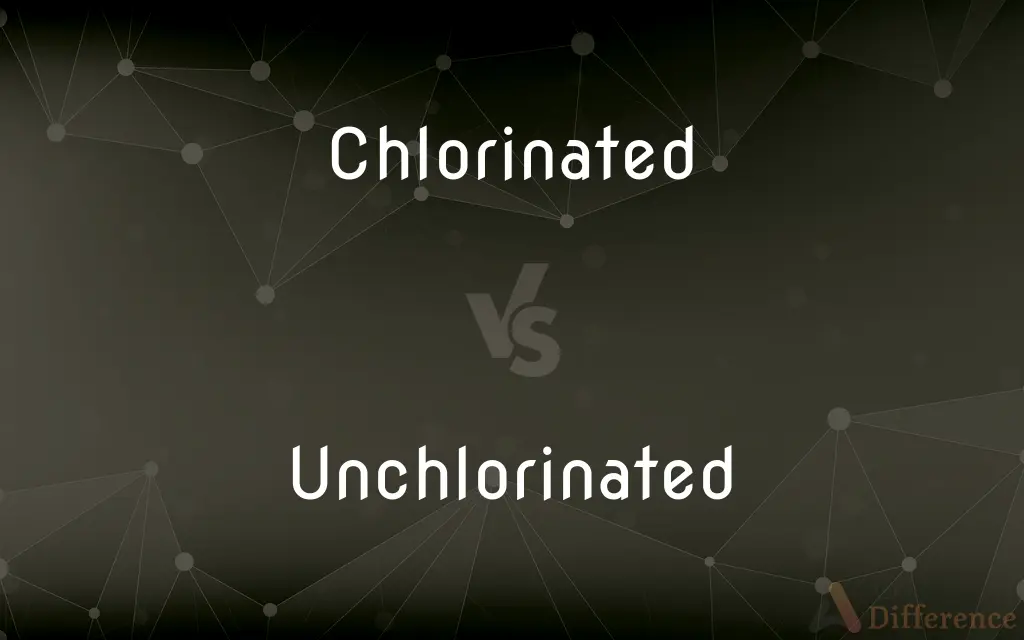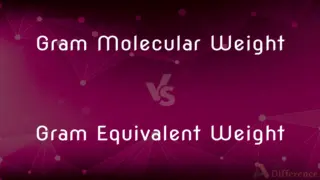Chlorinated vs. Unchlorinated — What's the Difference?
By Tayyaba Rehman — Published on November 6, 2023
Chlorinated refers to substances treated with chlorine, while unchlorinated means they have not undergone such treatment.

Difference Between Chlorinated and Unchlorinated
Table of Contents
ADVERTISEMENT
Key Differences
Chlorinated substances have undergone a process where chlorine is added. Unchlorinated substances, on the other hand, have not been exposed to or mixed with chlorine in any form.
In many municipal water systems, water is chlorinated to kill harmful bacteria and make it safe for drinking. Unchlorinated water might not have gone through this disinfection process and can potentially contain harmful microorganisms.
Chlorinated compounds, like chlorinated solvents, are often used in industrial applications due to their properties. However, unchlorinated counterparts might be chosen for environmental or health concerns.
Swimming pools often have chlorinated water to prevent the growth of algae and the spread of diseases. If a pool is unchlorinated, it might rely on other treatment methods or be more prone to microbial growth.
Chlorinated rubber is a type of synthetic rubber that's been modified with chlorine and has certain enhanced properties. An unchlorinated rubber wouldn't have these modifications and might behave differently in certain applications.
ADVERTISEMENT
Comparison Chart
Definition
Treated with chlorine
Not treated with chlorine
Usage
Disinfection, industrial applications
Natural state, alternative treatments
Safety in Drinking
Often safe due to bacteria elimination
Potential for harmful microorganisms
Environmental Impact
Can be harmful if released in large amounts
Usually has a lesser environmental impact
Example
Chlorinated swimming pools
Natural freshwater bodies like lakes and rivers
Compare with Definitions
Chlorinated
Saturated or combined with chlorine elements.
Chlorinated compounds can be reactive in certain conditions.
Unchlorinated
Lacking chlorine in its chemical structure.
Some unchlorinated solvents are marketed as eco-friendly.
Chlorinated
Treated or combined with chlorine.
The chlorinated water in the pool prevents algae growth.
Unchlorinated
Free from the presence of chlorine.
Unchlorinated pools rely on alternative disinfection methods.
Chlorinated
Having undergone disinfection using chlorine.
Chlorinated tap water is safer for drinking in many cities.
Unchlorinated
Not treated with chlorine.
Many prefer the taste of unchlorinated spring water.
Chlorinated
Modified by the addition of chlorine.
Chlorinated rubber has enhanced resistance properties.
Unchlorinated
Not having undergone a chlorination process.
Unchlorinated water might contain more microorganisms.
Chlorinated
Containing chlorine as part of its chemical structure.
Some chlorinated solvents are used for cleaning.
Unchlorinated
Not modified or combined with chlorine.
Unchlorinated rubber is in its natural state.
Chlorinated
To treat or combine with chlorine or a chlorine compound.
Unchlorinated
Not chlorinated
Chlorinated
Simple past tense and past participle of chlorinate
Chlorinated
(chemistry) Of water, that has had chlorine added to it to purify it.
Common Curiosities
Why is water often chlorinated?
Water is chlorinated to kill harmful bacteria, making it safe for drinking.
Is unchlorinated water safe for drinking?
Unchlorinated water may contain harmful microorganisms; it should be tested or treated before consumption.
Are chlorinated solvents harmful?
Some chlorinated solvents can be harmful to health and the environment and should be used with care.
What does chlorinated mean?
Chlorinated means having been treated with or containing chlorine.
Does unchlorinated mean organic?
Not necessarily. Unchlorinated only indicates the absence of chlorine.
Are there alternatives to chlorination?
Yes, alternatives include ozonation, UV disinfection, and reverse osmosis.
What is chlorinated rubber used for?
Chlorinated rubber is used in paints, coatings, and adhesives for its enhanced properties.
Can unchlorinated pools be sanitary?
Yes, but they might rely on other disinfection methods or treatments.
How can I dechlorinate water?
Leaving water out for 24 hours or using dechlorination tablets can help.
Is chlorinated water harmful to fish?
Yes, chlorine can be harmful or lethal to fish. Always dechlorinate water before adding to an aquarium.
Why might someone choose unchlorinated products?
Health, environmental concerns, or personal preference might guide this choice.
Is chlorinated water bad for plants?
In large amounts, chlorine can be harmful to plants. It's best to use dechlorinated water.
Are all disinfectants chlorinated?
No, there are many disinfectants that do not contain chlorine.
Why might a compound be chlorinated?
Chlorination can change properties, like solubility or reactivity, making the compound more useful in certain applications.
Is chlorination the only method to purify water?
No, there are several methods to purify water, including boiling, filtration, and ultraviolet treatment.
Share Your Discovery

Previous Comparison
Gram Molecular Weight vs. Gram Equivalent Weight
Next Comparison
Web Hosting vs. Web PublishingAuthor Spotlight
Written by
Tayyaba RehmanTayyaba Rehman is a distinguished writer, currently serving as a primary contributor to askdifference.com. As a researcher in semantics and etymology, Tayyaba's passion for the complexity of languages and their distinctions has found a perfect home on the platform. Tayyaba delves into the intricacies of language, distinguishing between commonly confused words and phrases, thereby providing clarity for readers worldwide.













































